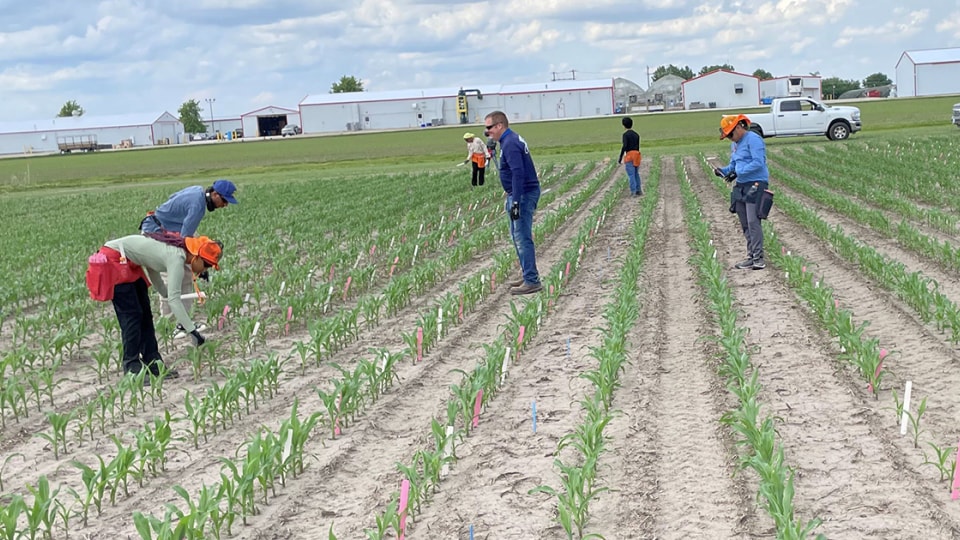Listening and Learning: Health Equity Collaboratory Series

- This Is Bayer
- Agriculture
- Consumer Health
- Pharmaceuticals
- Products
- Community
- News & Stories
- Careers
- This Is Bayer
- Agriculture
- Consumer Health
- Pharmaceuticals
- Products
- Community
- News & Stories
- Careers
Having proper access to food, care and safe places to practice physical activity is paramount in addressing cardiovascular disease. The Health Equity Collaboratory Series is an important step to raise awareness and demonstrate Bayer's vision of Health for All, Hunger for None.
1.3 billion people across the globe were food insecure in 2022, according to the United Nations. In the United States, nearly 25% of adults reported food insecurity, a five-point increase from 2021. Earlier this year, the U.S. Supplemental Nutrition Assistance Program (SNAP), the largest federal assistance nutrition program, reduced its emergency allotments meaning the average person to receive $90 less each month while food banks across the country have seen up to a 40% increase in food assistance demand.1, 2 Those who face food insecurity experience a 20% higher total in healthcare expenses than those who are food secured.3
At Bayer, we believe that food and nutrition enable people to live a healthier life. Bayer produced the Health Equity Collaboratory (HEC) Series, a series of three panel discussions with business leaders, community organizers, entrepreneurs, health professionals, and scholars to hear from others who share its vision of Health for All, Hunger for None. These dialogues helped Bayer garner a deeper understanding of the causes and consequences of health inequality.


Leading off the series, a panel discussed the key role that small, heart-healthy behaviors play in helping individuals live a healthier life, especially when it comes to preventing cardiovascular disease. They highlighted the perspectives of local communities, government leaders and professional organizations to help break down barriers, including strategies to address social determinants of health.
Heart disease impacts the African American community the hardest, as roughly 47% of Black adults have been diagnosed with cardiovascular disease to the 36% of White adults.4 It does not stop there. Social, economic, and environmental challenges in the United States leave Black Americans 30% more likely to die of heart disease than non-Hispanic white people.4
“It’s important to step back and recognize that cardiovascular disease has a lot of complexities. Disparities have a lot of complexities,” said Lisa Waddell, MD, MPH, Chief Medical Officer, CDC Foundation. “There are many contributors to high rates of disease and death [from cardiovascular disease].”
Having proper access to food, care and safe places to practice physical activity is paramount in addressing cardiovascular disease.
Bayer has continued its partnership with the CDC Foundation’s Alliance for Million Hearts Campaign. We are proud to be working relentlessly with the national initiative to prevent one million heart attacks and strokes each year within the next five years, with a distinct focus on increasing access to healthcare for people of color that are disproportionally affected by heart disease.




The second installation of the series took a deeper dive with panelists who specialized in agriculture, food systems, health policy and retail healthcare.
Food has an immense impact on health, including increasing or decreasing risk for cardiovascular disease. The U.S. Department of Agriculture (USDA) served 1 in 4 Americans throughout the course of 2022, while providing children, income-eligible individuals, and families access to safe, nutritious and equitable food. Another obstacle to ensuring food security for all is the conflict between Russia and Ukraine.
Bayer commissioned a Harris Poll in 2021 that concluded:
“Poor nutrition is a leading cause of illness, responsible for more than 600,000 deaths per year,” said Sara Bleich, PhD, Director of Nutrition Security and Health Equity, USDA. “And children without consistent access to nutritious foods are at higher risk for diet-related chronic conditions like obesity and diabetes.”



The final portion of the series focused on community organizations helping to combat food insecurity while they promote evidence-based interventions.
Last September, President Biden hosted the first White House Conference on Hunger, Nutrition and Health in more than 50 years. One of the pillars of the conference was to integrate nutrition and health. Of particular concern in the United States — 20 percent of young people aged 2 to 19, and 42 percent of adults have obesity, which raises the risk for heart disease, Type 2 diabetes and some cancers.6 Despite the prevalence of obesity, nutrition programs in the United States are typically not seen as part of the healthcare ecosystem, rather merely as anti-hunger programs.
Since 1990, Community Servings has served Massachusetts and Rhode Island by providing more than 10 million medically-tailored meals to those living with critical and chronic conditions like HIV, cancer, diabetes and kidney disease. The organization recently received a $2 million grant from the National Institutes of Health (NIH) to aid its collaboration with Friedman School of Nutrition Science and Policy at Tufts University and UMass Chen Medical School to support their study of home-delivered medically tailored meals.7
“We really believe, both locally and nationally, that we’re building the argument for reimbursement for meals through federal and state programs like Medicare and Medicaid,” said David Waters, CEO, Community Servings. “And with that, we want to build scale around the country such that medically-tailored meals become a natural part of the healthcare system.”
Moving Forward
Health for All, Hunger for None is Bayer’s vision. The Health Equity Collaboratory Series is an important step to raise awareness and demonstrate our commitment to that vision.
“Alleviating barriers requires partnerships and collaboration with public, private and government organizations united with communities to build different strategies to reach recipients of different backgrounds,” said Al Mitchell, President, Bayer Fund. “It’s more than just building awareness. Working together, the collective partners must address underlying barriers preventing access to heart health in our communities.”
Solutions to advancing health equity and making nutrition accessible for all will not occur overnight, nor through a single company or organization. It is through working together and taking a holistic, integrated approach to uncover where future opportunities lie. Bayer is eager to continue its commitment by fostering additional conversations, convening relevant partners and through demonstrating its thought leadership.
To learn more about how Bayer is helping local communities combat these key issues through its philanthropic arm in the U.S., Bayer Fund, click here.
References
1 Data according to the Center on Budget and Policy Priorities. Additional information available here: https://www.cbpp.org/research/food-assistance/temporary-pandemic-snap-benefits-will-end-in-remaining-35-states-in-march
2 Data according to CNN Health. Additional information available here: https://www.cnn.com/2023/03/03/health/iyw-us-hunger-crisis-post-covid-help-trnd-wellness/index.html
3 Data according to Medical Xpress. Additional information available here: https://medicalxpress.com/news/2023-01-families-food-insecurity-greater-health.html#:~:text=The%20team%20collected%20data%20on%2014%2C666%20individuals%20from,food-secure%20families%2C%20an%20annual%20difference%20of%20about%20%242%2C456.
4 Data according to the Cleveland Clinic. Additional information available here: https://my.clevelandclinic.org/health/articles/23051-ethnicity-and-heart-disease
5 The research was conducted among 2,010 adults from June 28 – June 30, 2022.
6 Data according to the CDC under National Center for Chronic Disease Prevention and Health Promotion (NCCDPHP). Additional information available here: https://www.cdc.gov/chronicdisease/resources/publications/factsheets/nutrition.htm
7 Data according to PR Newswire. Additional information available here: https://www.prnewswire.com/news-releases/largest-study-of-medically-tailored-meals-advances-with-nih-grant-301638206.html











